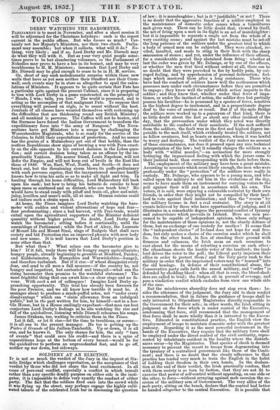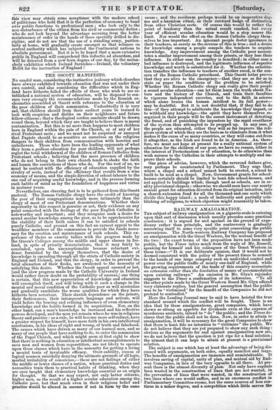SOLDIERY AT AN ELECTION.
It is not so much the verdict of the jury in the inquest at Six- mile Bridge which challenges reprobation, as the acceptance of that verdict by those who did not share the local excitement. In all eases of personal conflict, especially a conflict in which tumult rather than any specific deadly purpose on either side is the insti- gator, it is impossible to define very exactly the conduct of either party. The fact that the soldiers fired once into the crowd while it was flying up the street, may perhaps engage the highly sushi- wated talents of the celebrated Irish bar in discussing the question
of law : it is manslaughter ; but is it " justifiable" or not ? There is no doubt that the aggressive function of a soldier employed in the maintenance of domestic order ceases when a tumultuous mob gives way. There can be little doubt that, viewed by itself, the act of firing upon a mob in its flight is an act of manslaughter : but it is impossible to separate a single act from the whole of a very exciting scene ; and against the last mistake must be set-off the long patience of the soldiers under the greatest trial to which a body of armed men can be subjected. They were attacked, re- viled, insulted, and made to sting in their flesh with the sharp concussion of atones; and yet, under the influence of their officers, for a considerable period they abstained from firing : whether at last the order was given by Mr. Delmege, or by one of the officers, or whether the men first fired without orders at all, there can be no doubt that they were provoked to fire by bodily pain, by out- raged feeling, and by apprehension of personal destruction; feel- ings which mastered them after a long resistance. Those who have had the conduct of soldiers know well the restlessness which possesses men under such circumstances before they are permitted to engage ; they know well the relief which action imparts to the soldier ; and they know that, whether under that fever of impa- tience, or under the instinct of action, the soldier does but partially possess his faculties—he is possessed by a species of fever, sensitive us the highest degree to incitement, and in a proportionate degree deaf to the voice of caution or recall. But if at Six-mile Bridge the soldiers were worked up to a paroxysm of that kind, there is as little doubt about the fact as about any other incident of the day, that the provocation under which they acted was directly ascribable to the conduct of their assailants. If the mob suffered from the soldiers, the fault was in the first and highest degree im- putable to the mob itself, which evidently treated the soldiers, not as fellow creatures, but as beasts or monsters, whom it was lawful to worry and destroy. The verdict of the Jury makes no account of these circumstances, nor does it proceed upon any nice technical interpretation of the law ; but it roundly charges the soldiers as a body with "wilful murder "—an accusation far more strongly betray.ing the impassioned feeling with which the jurors came to their judicial task, than corresponding with the facts before them. The employment of the military may have been a great mistake. According to accounts which seem likely enough, the men who were professedly under the "protection" of the soldiers were really in custody. Mr. Delmege, who appears to be a young man, and who called upon the military to aid him in the evolutions of the day, seems to have made them an instrument for carrying voters to the poll against their will and in accordance with his own. The voters, it is said, were enjoying a colourable restraint by their own friends, in order that they might not be compelled by their land- lord to -vote against their inclination; and thus the "rescue" by the military became in fact a real restraint. The story is at all events believed by those who have opportunities of judging, and it illustrates in a remarkable degree the perennial conflict of tyranny, and subservience which prevails in Ireland. Here are men pre- sumed to be capable of independent opinions whose only refuge for the maintenance of those opinions is, not the sturdy defence of them, but an exchange of one custody for another ! It seems that the "independent elector" of Ireland does not hope for real free- dom, but only makes a choice of the coercion under which he shall lie. On the other hand, in lieu of standing their ground with firmness and calmness, the Irish seem on such occasions to east about for the means of retorting a coercion on each other : the ribandman shoots the hostile voter of the landlord ; the land- lord drives the voter to the poll ; the Liberal party imprison their allies in order to protect them and the Tory party rush to the military in order that the imprisoned voters may be "rescued" into the old bondage. In defence of their constitutional abuse, the Conservative party calls forth the armed military, and "order "is defended by shedding blood : when all that is over' the blood-shed- ders are called to trial ; the Judges sit in pursuit of revenge, and pass a vindictive verdict which excludes from view one whole side of the case.
But the mischievous absurdity does not stop even there: be- sides the utterance of the judgment, the Jury add to their verdict a recommendation, that in future the guidance of troops shall be only intrusted to Stipendiary Magistrates directly responsible to the Government for their acts ; in other words, the Irish sitting in judgment on the force which is under control of the Executive, condemning that force, still recommend that the management of that force shall be more wholly than it is intrusted to the Execu- tive. Educated in constitutional practice, the English view the employment of troops to maintain domestic order with the greatest jealousy. Regarding it as the most powerful instrument in the hands of the Executive, they require that the military force shall be employed under the direct control of the civil authority, repre- sented, by inhabitants resident in the locality where the disturb- ances occur—by the Magistrates. That species of check is deemed necessary to prevent the resort to troops from degenerating into the tyranny of a centralized government like those of the Conti- nent; and there is no doubt that the steady adherence to that practice has tended very much to train the English in the habit of holding their freedom in their own hands. In the declara- tion at the end of their verdict, the Irish practically confess, that with them society is so torn by faction, that they are not fit to exercise that power of self-control without appealing, on one side or the other, to force—without arraying against mob coercion the co- ercion of the military arm of Government. The very allies of the mob party, sitting on the bends, declare that the control had better be handed altogether to the central Executive. It is possible that
this view may obtain some acceptance with the modern school of politicians who hold that it is the perfection of economy to hand over public functions to professional men ; who look only to the non-disturbance of the citizen from his civil or commercial duties ; who do not look beyond the advantage accruing from the better maintenance of order in the hands of those specially drilled to dis- cipline, and do not see that the use of a standing army, particu- larly at home, will gradually create amongst us that reliance on central authority which has subjected the Continental nations to absolute government. But it is to be hoped that a more extensive public in England will comprehend this reductio ad absurdam, and will be deterred from a new-born dogma of our day, by the melan- choly exhibition which Ireland furnishes—Ireland, the voluntary Helot for the instruction of England !



























 Previous page
Previous page